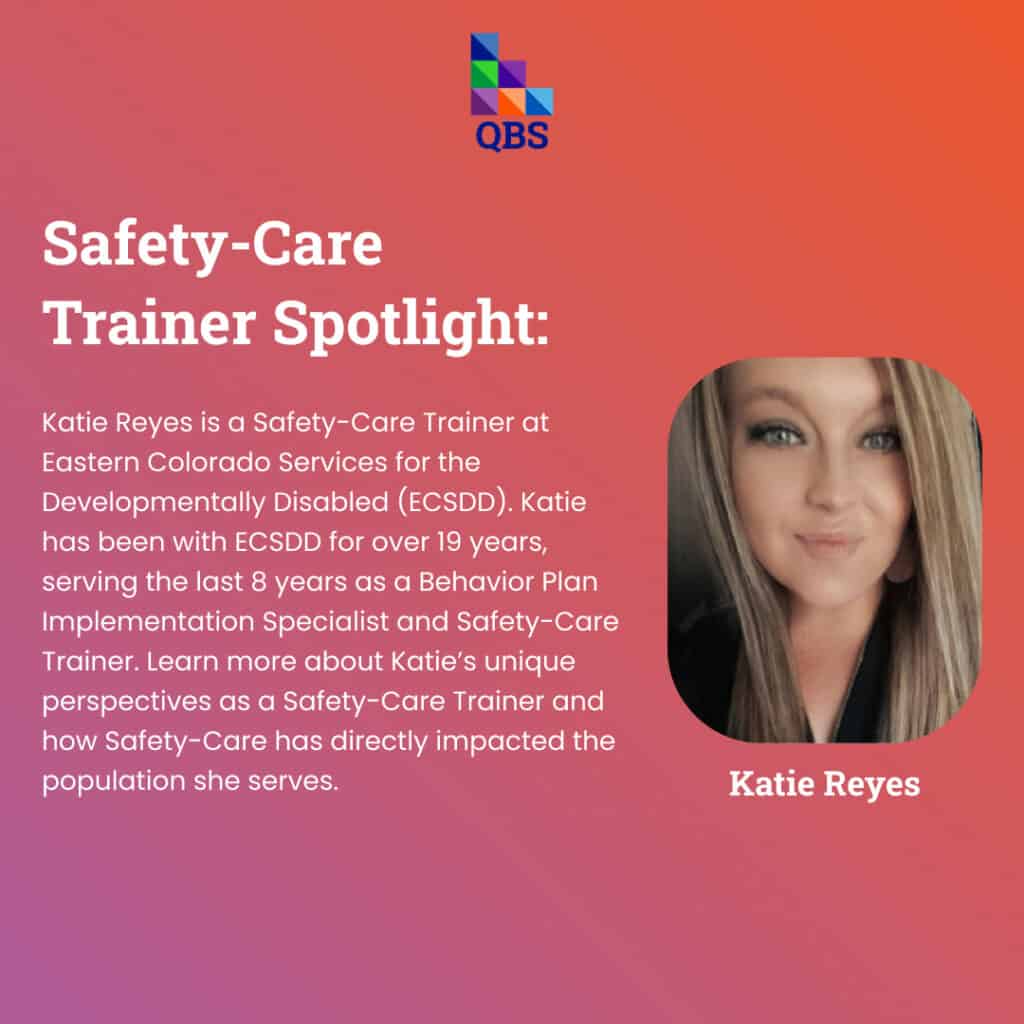Katie Reyes is a Safety-Care Trainer at Eastern Colorado Services for the Developmentally Disabled (ECSDD). Katie has been with ECSDD for over 19 years, serving the last 8 years as a Behavior Plan Implementation Specialist and Safety-Care Trainer. Learn more about Katie’s unique perspectives as a Safety-Care Trainer and how Safety-Care has directly impacted the population she serves.

What unique perspectives do you bring to your trainings?
We discuss and share a lot of examples that have to do with our personal experiences and with the individuals we serve. We have many years of rapport and knowledge about these individuals, which then helps provide a more meaningful training.
What do you like most about teaching Safety-Care?
I love getting to spend the day with our staff, engaging with them and sharing experiences both old and new. It gives me the opportunity to build and continue to improve rapport with the staff and learning their unique individual styles has helped tremendously for a more successful training experience.
What is your favorite Safety-Care skill and why?
I really like the Help strategy. I feel this strategy is very useful in helping our individuals express and communicate their wants and needs more appropriately. We get so used to working with our individuals that we tend to know what they want or need on a daily basis. However, when new staff come in and those veteran staff aren’t on shift, it’s very challenging trying to figure out what those wants and needs are. We really encourage using this strategy whether the individual is agitated or not to get the individual to communicate to us more effectively.
Tell us about a situation with a client where Safety-Care was implemented successfully.
We had an individual who would headbutt objects, and we knew that by talking to this individual, he would start to escalate and end up in crisis. Typically, this individual would headbutt an object, but as long as staff weren’t talking, the individual would walk away from the object pretty quickly and de-escalate. We stressed to staff to utilize the Safety-Care’s Wait strategy, monitor for safety, and only intervene if needed.
This individual had started to headbutt a glass window which became a very dangerous situation. One particular staff really struggled with staying calm and not pleading for this individual to stop knowing how dangerous it was, even though they knew this would only escalate him. I instructed the staff to still use the Wait strategy by not talking or making eye contact but to use a soft barrier (pillow, couch cushion, etc.) between the individual and the window instead. This allowed us to go from a very dangerous situation to a less dangerous situation.
The staff person came to me a few days later after following my instructions and was almost in tears because it worked! Every time the individual would headbutt the glass, the staff only placed the barrier between the individual and the glass but still didn’t make eye contact or talk. The individual de-escalated and walked away with no injury.
As a seasoned Safety-Care trainer, what recommendations do you have for new Safety-Care trainers?
Be open to the reality that sometimes Safety-Care doesn’t always have the answer for a specific situation. All we can do is try our best with the skills and tools we are taught. I encourage you to try and build rapport with staff during training as much as you can, so staff are more comfortable and open to asking questions.
Want to learn more about how Safety-Care can improve your client outcomes and safety for everyone? Schedule time to speak with our team today!
About Eastern Colorado Services for the Developmentally Disabled
Eastern Colorado Services for the Developmentally Disabled (ECSDD) is located on the plains of northeast Colorado serving adults aged 18 to end of life in residential group homes, day programs, and host homes. Since 1973, ECSDD has been serving individuals with intellectual and developmental disabilities, making it the longest running service provider in the area. Started as a grassroots effort to move people out of institutions and closer to loved ones, ECSDD’s mission is to assist in enhancing the lives of persons with varying abilities in relation to their families, education, friends, and opportunities within the community.
 By using our site, you consent to our use of cookies to enhance functionality and analyze site performance.
By using our site, you consent to our use of cookies to enhance functionality and analyze site performance.